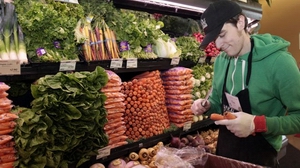 Global food prices rose 1 percent in March, the United Nations' food agency said on Thursday, pointing to a surge in dairy costs, while cereals prices were little changed and seen facing downward pressure in coming months.
Global food prices rose 1 percent in March, the United Nations' food agency said on Thursday, pointing to a surge in dairy costs, while cereals prices were little changed and seen facing downward pressure in coming months.Food prices spiked over the summer of 2012 fuelled by a historic drought in the United States and dry weather in other major producers. Prices eased slightly towards the end of last year but have been nudging higher again for the past two months.
The Food and Agriculture Organisation's (FAO) price index, which measures monthly price changes for a basket of cereals, oilseeds, dairy, meat and sugar, averaged 212.4 points in March, up 1 percent from 210.7 in February and its highest since October 2012.
"All the dynamic this month comes from the dairy," said FAO senior economist Concepcion Calpe. "In general the situation is relatively calm."
FAO's dairy price sub-index jumped 22 points in March to 225.3, one of its largest changes ever recorded.
The rise was fuelled mainly by prolonged hot, dry weather in Oceania which has hit pastures and led to milk production falling off steeply and a subsequent decrease in processing of dairy products, which include butter, cheese and milk powder.
FAO's dairy products index is based on prices in the world's largest dairy exporter New Zealand, which have climbed as buyers bid against each other to meet commitments.
A usual spring surge in milk production in Europe has also been slowed down by unfavourable weather limiting pasture growth, FAO said.
When pastures are hit by dry weather, cows produce less milk or need supplementary feedstuffs, which push up costs.
Cereals prices on the other hand were little changed, and Calpe said they could see declines in coming months due to the prospect of a strong recovery in output.
"We are optimistic for the coming crops. The previous year was particularly bad so barring something dramatic the direction should be upwards for production," she said. "If this is what happens we could see prices trending downwards."
Grain prices, which touched record highs late last summer, have been under pressure recently as acreage dedicated to crops has increased, reserves look fatter than previously thought, and livestock producers have cut herd sizes due to high feed costs.
Higher Output
FAO maintained its forecast for world wheat production in 2013 at 690 million tonnes, up 4.4 percent from last year. It expected world cereal stocks at the close of seasons ending in 2013 to approach 500 million tonnes.
The Rome-based agency also raised its estimate of world cereal output in 2012 to 2.309 billion tonnes, up 3 million tonnes from a forecast made in March, but still 2 percent below record production in 2011.
Other food types included in the index showed mixed trends. Oils and fats prices fell 2.5 percent from February due to a favourable supply outlook, and meat prices also fell on adequate export supplies and a small reduction in feed prices.
Sugar prices rose due to a short-term supply disruption caused by delays at ports in Brazil, the world's largest sugar producer and exporter.
The FAO's index is below a record peak of 237.9 points hit in February 2011, when high food prices helped drive the Arab Spring uprisings in the Middle East and North Africa.
Over the summer last year, global food prices spiked for the third time in four years, with the index reaching 215.7 points in September 2012, close to levels since during the 2008 food crisis which sparked riots in several poor countries.
Visit the source article





